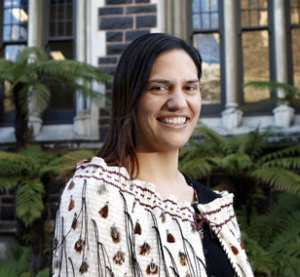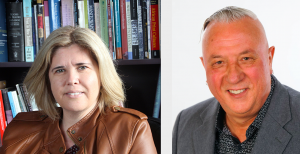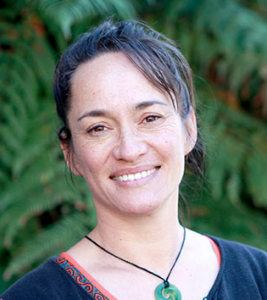Te Tumu in this year’s Marsden Round
This has been a great year for research in Te Tumu. Every November Te Pūtea Rangahau a Marsden (Marsden Fund), run by the Royal Society Te Apārangi, announces its forthcoming research grants. Winning a grant is a two stage process, with applicants having to get past a preliminary round, then develop their applications for the second round; they have about a 10% chance of success in the Humanities and Social Sciences panels. There are six successful applications within the Division of Humanities, three of which have a Te Tumu connection.
Dr Karyn Paringatai‘s project “E kore au e ngaro! The enduring legacy of whakapapa” ($823,000, Social Sciences panel) looks at how the knowledge of whakapapa can impact on health, with particular reference to Māori affected by the CDH1 cancer-causing gene. Click here for more information. Professor Parry Guilford, Director of Otago’s Centre for Translational Cancer Research, is an associate investigator on the project.
Associate Professor Lachy Paterson is a principal investigator alongside Associate Professor Angela Wanhalla (History Department) on “Te Hau Kāinga: Histories and Legacies of the Māori Home Front, 1939-1945” ($746,000, Social Sciences panel), exploring the lived experiences of Māori who remained in New Zealand during the Second World War. Click here for more information. Although the project begins next year, one of our undergraduate students, Haeata Watson, has already started a project looking at Ngāti Kahungunu experiences, funded through a Ngā Pae o te Māramatanga Summer Internship.
Both Karyn and Lachy are based in Te Tumu’s Māori Studies programme, occasionally teaching into the Indigenous Development programme. Karyn also coordinates the Master of Indigenous Studies programme.
Professor Merata Kawharu, who until recently held an adjunct position within Te Tumu but is now based at the Centre for Sustainability, was also successful. Her project, “A question of identity: how connected are Māori youth to ancestral marae, and does it matter?” ($605,000, Humanities panel) will investigate the relationships that young Māori have with their marae. Click here to find out more. Merata with be working with associate investigators, Dr Stephen McTaggart (University of Auckland), former Dean of Te Tumu, Professor Paul Tapsell (now at the University of Melbourne) and Dr Krushil Watene (Massey University).
Special thanks to Marjoleine Righarts, Research and Enterprise’s Research Advisor for Humanities who helped immensely with all the applications.
Te Tumu Research Roundup
Te Tumu staff have been active with research in the first half of the year. The highlights (listed below) show the depth and diversity of the research undertaken at the School.
In April Te Tumu hosted a three-day conference, Te Kura Roa: Minority Language & Dialect Conference, that attracted a number of speakers, from within New Zealand, as well as from USA, Tahiti, Australia, Scotland and Israel. Poia Rewi was the driving force behind this conference, a collaboration between the University of Otago, Victoria University and Ngā Pae o te Māramatanga. Suzanne Duncan was the key organiser, ably assisted by a number of students.
In May Te Tumu celebrated its 25th Anniversary, in conjunction with the Māori Centre’s anniversary. Events were organised by a committee headed by Karyn Paringatai and Suzanne Duncan. Of particular note was a one-day symposium at which a number of Te Tumu alumni presented on where their university educations had taken them.
In July, the book “The Lives of Colonial Objects” was published by Otago University Press, comprising a number of short essays on particular objects. Four Te Tumu staff contributed chapters: Megan Pōtiki on a tokotoko held by her whānau; Paerau Warbrick on a Māori Land Court Minute Book; Pāora Tapsell on the Te Haupapa cannon at Maketū; and Lachy Paterson on a press used to print a Māori-language newspaper in the 1860s. Also in this volume is a chapter by Michael Stevens, a former Te Tumu post-doc, on his whānau’s kahukiwi.
Pāora Tapsell, Poia Rewi and Tangiwai Rewi were on Research and Study Leave in Semester 1, with Matiu Ratima, Jim Williams and Michael Reilly away for Semester 2. Pāora Tapsell has recently returned from Vienna, having given a keynote address “Waka Wairua: Imagining an Other way of knowing our Pacific” at the New Zealand Studies Association conference. Matiu Rātima was awarded the Fulbright-Nga Pae O Te Maramatanga Scholar Award; this allows him to spend time at the University of Hawai’i to observe the teaching of Hawaiian languages.
In May, Megan Pōtiki published an article in the New Zealand Journal of History, 49, 1 (2015) on the Māori-language writings of H.K. Taiaroa and Tame Parata, and in June presented at a paper at the 4th International Conference on Language, Literature and Linguistics in Singapore on the use of old manuscripts as a means of revitalizing Kāi Tahu reo. Megan is writing this up for publication at present.
In February, Lachy Paterson gave a Waitangi Day at the Dunedin Art Gallery on past, present and future perceptions of the Treaty of Waitangi. As he didn’t have any teaching duties in Semester 1 he was able to travel to Canada in February/March where he gave a number of talks at the University of Alberta and University of Manitoba on ‘Indigenous Literacy and Literacy Practices: Māori in the 19th Century’ and (with Angela Wanhalla) ‘Indigenous Women, Writing and Colonialism’. In April he presented at a conference on colonial print media at the University of Cambridge, UK.
In June Jenny Bryant-Tokalau presented a paper entitled ‘New Communities and the State in Suva, Fiji’ to the Urban Melanesia theme at the European Society for Oceanistes Conference (ESFO), in Brussels. The paper will be published in a special edition of the Journal de la Société des Océanistes in 2016.
Tangiwai Rewi has recently published an article in the Journal of the Polynesian Society, 124, 1 (2015) on ‘The Ngāruawāhia Tūrangawaewae Regatta: Today’s Reflections on the Past’. Click here to access.
In February, Michelle Schaaf presented on ‘The role of family in Pacific migrant participation in physical activity and sport’ at the Inaugural International Conference on Migration Social Disadvantage and Health, in Melbourne.
Merata Kawharu and Karyn Paringatai both spoke at at Hui Poutama 2015: Māori Research Sympoisum in May. Hui Poutama is the University of Ōtāgo’s biennial symposium of Māori research. Karyn’s talk was on ‘The value of the dark: The students’ perspective’, and Merata Kawharu’s on ‘Entrepreneurship: the relevance of a customary context. A Ngāti Whātua narrative’.
Karyn Paringatai‘s research on teaching in the dark is in demand. She presented at a recent Pecha Kucha event at the Dunedin Public Art Gallery, and in July gave a keynote presentation at the Tuia Te Ako hui at Lincoln University.
Lyn Carter has two works in press: ‘Climate Change and Aotearoa New Zealand: A review’, a journal article with Wiley Interdisciplinary Review (LSE); and ‘Iwi are where the People are: Rethinking Ahi Kā and Ahi Matao in Contemporary Māori Society’ in the forthcoming Huia Publishers book, Home. Here to Stay!
Finally, Te Tumu is revamping its MAOR 102 textbook. The old book, Ki te Whaiao: An Introduction to Māori Culture and Society was published in 2004, and while it had served its purpose well, staff felt that a new volume was necessary. As with Ki te Whaiao, Te Tumu staff are doing most of the writing for this new book.
Staff Profile: Professor Paul Tapsell
Professor Paul Tapsell (Ngāti Whakaue and Ngāti Raukawa) talks about his research journey and philosophy. As part of our occasional series of profiling Te Tumu faculty members, Dr Matiu Rātima interviews Prof. Tapsell, whose research interests include Māori identity in 21st century New Zealand, cultural heritage & museums, taonga trajectories in and beyond tribal contexts, Māori values within governance policy frameworks, Indigenous entrepreneurial leadership, marae and mana whenua, genealogical mapping of tribal landscapes and Te Arawa historical and genealogical knowledge. (Audio length: 17.5 minutes.)
He Pūtea Rangahau – Māori Research funding opportunities
News on two upcoming Māori research funding opportunities
From Ngā Pae o te Māramatanga
We will be commissioning new research around “Optimising Maori Economic performance”. What we would like you to do is be very creative when looking at the RFP and see how you can wrap it within your own discipline. We have funding for four projects so it is competitive. However, in these times we are pleased to offer this investment and look forward to your applications.
From the Website:
“NPM seeks to invest in research projects focussing on its research priocrity ‘Optimising Māori Economic Performance’ that aligns to its research direction. The total maximum budget available per project is $150,000 (fully costed, exclusive of GST, over 12 months). Funding is available for a 1 December 2014 commencement date.
NPM is seeking applications from individuals or groups within its PRE Network interested in undertaking research within the scope of the RFP. Applications should provide a concise summary of the research project including:
Up to two pages outlining the proposed research (goals and objectives, methods, details of the significance and/or relevance of the research); Excellence, Benefits and Transformations; An outline of the relevant collaborative arrangements; A dissemination plan; Biographical sketches; and Budget details.
The applications details are short but must contain in the proposal a specific research question and methodology. Applicants should have identified a research team and the study design and methods the team propose to use. Applicants should have secured access to information (or have clearly identified the pathways for access) and demonstrated mechanisms for engagement of key stakeholders, including the express support of Māori communities or other relevant parties where required. The research outlined in the application is expected to be feasible with a 12 month time frame and with a corresponding budget.
Click here for contact details.
From Te Taura Whiri i te Reo Māori (Māori Language Commission)
He pānui tōmua tēnei e pā ana ki ngā ratonga rangahau (whakaurunga kaipupuri pānga) e hiahiatia ana e Te Taura Whiri i te Reo Māori, e He Puna Whakarauora ā, ko tāna Rārangi Take Rangahau ā-Motu te kaupapa.
Ka puta tētahi Tono Marohi ki runga i a GETS i te marama o Mahuru. Ko te tikanga, hei whakamōhiotanga tōmua tēnei tuhinga i ō mātou hiahia tērā pea ka whakatakotoria, te angawā me ngā here ā-mua hoki e whai wāhi ai ngā kaiwhakarato torohū ki te whakaaroaro mehemea ka pīrangi rātou ki te tāpae i tētahi tono.
Mā te Pānui Tōmua, tēnā e ai tō aro ki te pae ipurangi.
This is an advance notice of research services (stakeholder engagement) required by Te Taura Whiri i te Reo Māori, He Puna Whakarauora, in relation to its National Research Agenda.
A Request for Proposal will be advertised on GETS in September. This is only intended to provide some advance notice of our likely requirements, timeframe and preconditions to enable potential suppliers to consider in advance whether they wish to submit a proposal.
For the full notice please refer to the Government Electronic Tender Service website
GETS RFx Id: 3432637, Whakaurunga Kaipupuri Pānga Reo Māori, Māori Language Stakeholder Engagement





